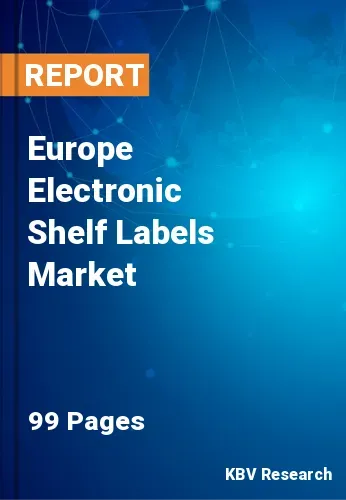The Europe Electronic Shelf Labels Market would witness market growth of 11.7% CAGR during the forecast period (2022-2028).
The retail industry has grown exponentially over the last several years, driven by changes in customer behavior, rising disposable incomes, and a growing convergence of online and offline retail formats. Retailers have had to adapt as consumers increasingly demand to stay relevant for their clients by changing their offerings, marketing strategies, presence, and appeal. The future transformation will be fueled by technology; therefore, merchants must invest in the necessary infrastructure and seek to upgrade their facilities.
In addition, technology will advance the sector, eliminating physical contact, from checkout-free to touch-free purchasing, merchandise, to transactions. Thus, the continued potential in the retail industry might significantly influence the deployment of ESLs.
Electronic product labels make it easier for customers to obtain product information and use NFC or mobile devices to make quick payments. Reading the label instructs the customer's phone to go to the product webpage for further details using built-in NFC. Also, the customer may pay instantly, eliminating the need to stand in line at the cash register. More people will embrace electronic labeling as retailers prioritize using digital technology to increase revenues.
The EU economy places great importance on retail and wholesale services. For practically every firm, digital transformation is a necessary development component, and contemporary retail needs it more than ever. By incorporating online storefronts, digital payments, and other products of innovation in the retail sector, retailers are enhancing the physical shopping experience with technology and opening up new income streams. To fight the region's fierce rivalry, grocery merchants employ AI technology. Kaufland, for example, uses dynamic pricing utilizing electronic shelf labels and AI to analyze vast quantities of data, including the prices of rivals, to adjust prices and create shop promotions instantaneously. This supports the growth of the regional market.
The Germany market dominated the Europe Electronic Shelf Labels Market by Country in 2021, and would continue to be a dominant market till 2028; thereby, achieving a market value of $209.8 Million by 2028. The UK market is anticipated to grow at a CAGR of 10.8% during (2022 - 2028). Additionally, The France market would exhibit a CAGR of 12.6% during (2022 - 2028).
Based on Component, the market is segmented into Display, Microprocessors, Batteries, Transceivers and Others. Based on Product Type, the market is segmented into Fully Graphic E-paper Displays, LCDs and Segmented E-paper Displays. Based on Communications Technology, the market is segmented into Radio Frequency, Infrared, Near-field Communication and Others. Based on Application, the market is segmented into Retail and Industrial. Based on Display Size, the market is segmented into Less than 3 Inches, 3 to 7 Inches, 7 to 10 Inches and More than 10 Inches. Based on countries, the market is segmented into Germany, UK, France, Russia, Spain, Italy, and Rest of Europe.
Free Valuable Insights: The Global Electronic Shelf Labels Market will Hit $2.7 Billion by 2028, at a CAGR of 13.1%
The market research report covers the analysis of key stake holders of the market. Key companies profiled in the report include SES-Imagotag (BOE Technology Group Co., Ltd.), Opticon Sensors Europe B.V., Pricer AB, Displaydata Limited, M2Comm, Rainus Co., Ltd., Shanghai Sunmi Technology Co., Ltd., Hanshow Technology Co. Ltd., Solum Co., Ltd, and Teraoka Seika Co., Ltd.
By Component
By Product Type
By Communications Technology
By Application
By Display Size
By Country

Our team of dedicated experts can provide you with attractive expansion opportunities for your business.

